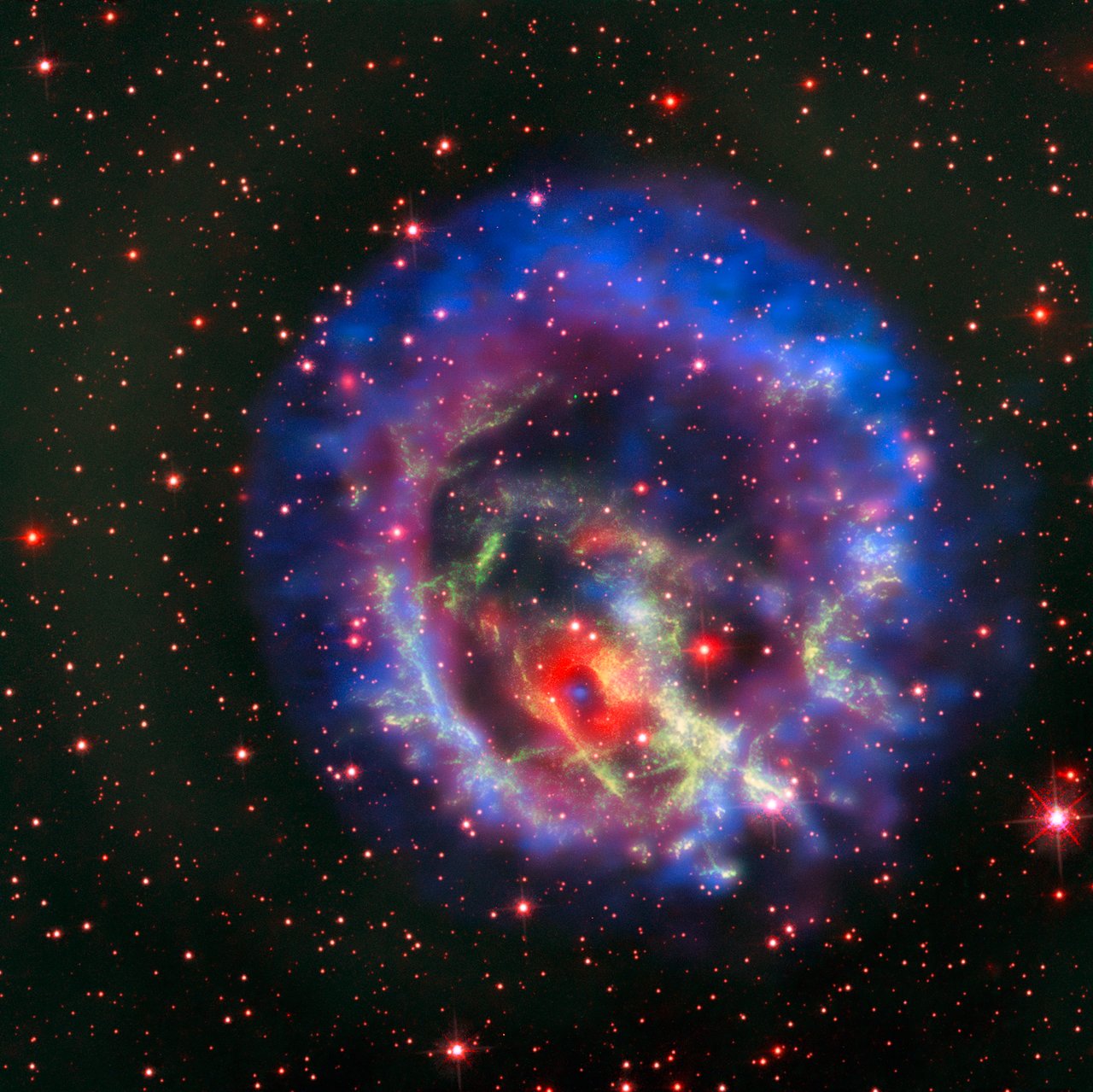Musings on Supernova Remnant
ω
The MUSE of spectral range field view wide
for the image composite shown
as tool with telescope large to guide
discovered the first object known
of its kind beyond the Milky Way
in the Cloud Magellanic Small,
which had a supernova heyday
when its brilliance burst over all.
That stellar explosion tremendous
about two thousand years ago
has been pictured with tints stupendous
in the remnant’s wispy outflow.
‘Tis a dazzling portrayal festive
unveiled in x-ray wavelength shine,
aided by acronym suggestive
of those Grecian deities nine.
The sidereal corpse that’s buried
among filaments left behind
from the blast where remains were carried
appears in a circle confined
at the center by gaseous ring
ruby hued with celestial art
midst the great luminosity fling
around a blue source at the heart.
Rendered by Chandra, ESO, Hubble,
and various team members more,
within what resembles a bubble,
researchers found mystery core
having x-ray fount of neutron star
in ultra-dense hub sapphire bright,
that’s two hundred thousand light-years far,
surrounded by bracelet of light.
Albeit the astral orb is dead
those swirling clouds where it’s concealed
encircled by torus halo red
are in living color revealed.
Classical cultures the Muses viewed
as nine personifications
of every artistic aptitude
as well as knowledge foundations.
What further marvels will MUSE disclose
or dear Urania inspire,
with ‘touch of majesty’, heaven knows,
from ‘o’er her star-bespangled lyre’,
to poet Percival paraphrase,
citing ‘Ode to Music’ lyric
about the Greek divinities’ ways
penned as tuneful panegyric?
Urania goddess supernal,
Mnemosyne’s daughter by Zeus,
a mythic immortal eternal,
lends us cosmic visions profuse.
How rare, how precious existence seems
in universe we’re aware of
on planet with oceans, forests, streams
we mindlessly don’t take care of.
May Man raise wondering gaze aloft
where earth and heavens intertwine
and learn to live in a manner soft,
hand in hand with Nature’s design,
while purifying senses anew,
as wisdom breezes gently blow,
on the path to enlightenment true,
via Nam Myoho Renge Kyo!
~ Harley White
* * * * * * * * * *
Inspiration derived from the following sources…
Dead Star Circled by Light ~ with image and diagram...
This Newfound Stellar Remnant Is the First of Its Kind: Why It’s So Special...
Astronomers Find a “Stellar Corpse” Buried in Cosmic Graveyard ~ with video...
Multi-unit spectroscopic explorer (MUSE)…...
Muses...
Urania…...
AN ODE TO MUSIC ~ by James G. Percival
Dead Star Circled by Light ~ MUSE data points to isolated neutron star beyond our galaxy ~ with image and image info...
Further inspiration derived from the teachings and writings of Nichiren Daishōnin…
Nam Myōhō Renge Kyō means to devote our lives to and found them on (Nam[u]) the Utterness of the Dharma (Myōhō) [entirety of existence, enlightenment and unenlightenment] permeated by the underlying white lotus flower-like mechanism of the interdependence of cause, concomitancy and effect (Renge) in its whereabouts of the ten [psychological] realms of dharmas [which is every possible psychological wavelength] (Kyō).
The reason that we continually recite Nam Myōhō Renge Kyō
Image data ~ New images from ESO’s Very Large Telescope in Chile and other telescopes reveal a rich landscape of stars and glowing clouds of gas in one of our closest neighboring galaxies, the Small Magellanic Cloud. The pictures have allowed astronomers to identify an elusive stellar corpse buried among filaments of gas left behind by a 2000-year-old supernova explosion. The MUSE instrument was used to establish where this elusive object is hiding, and existing Chandra X-ray Observatory data confirmed its identity as an isolated neutron star.

Credit: ESO/NASA, ESA and the Hubble Heritage Team (STScI/AURA)/F. Vogt et al.
| Table of Contents |
|